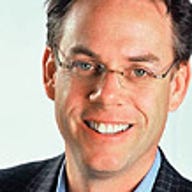Trust me, smart starts with authenticity

 Dr. Nick Morgan has certainly earned his place as one of America’s top communication theorists and coaches. Starting out with a PhD in literature and rhetoric, Nick next took on political speech writing, had a career teaching public speaking at several prestigious Universities and then added to his experience by launching his own successful consultancy helping Fortune 50 CEO’s achieve success in front of audiences. Mix in five years as the editor of the Harvard Management Communication Letter and it’s lucky for us that with his vast knowledge and desire to share he really knows how to communicate. Through his books, articles and speeches Nick always sets the example by making his points in a way that is actionable, powerful and fun.
Dr. Nick Morgan has certainly earned his place as one of America’s top communication theorists and coaches. Starting out with a PhD in literature and rhetoric, Nick next took on political speech writing, had a career teaching public speaking at several prestigious Universities and then added to his experience by launching his own successful consultancy helping Fortune 50 CEO’s achieve success in front of audiences. Mix in five years as the editor of the Harvard Management Communication Letter and it’s lucky for us that with his vast knowledge and desire to share he really knows how to communicate. Through his books, articles and speeches Nick always sets the example by making his points in a way that is actionable, powerful and fun.
With his new book on authentic communications, Trust Me: Four Steps to Authenticity and Charisma, published this year by Jossey-Bass and on sale now, we thought we’d check in and get Nick’s perspective and tips.
What’s the mission of your company, Public Words Inc?
We help people tell their stories -- speakers, authors, executives, and artists who have compelling messages they want the world to hear. We work with them to structure and deliver their messages for maximum impact, design marketing programs that catch the world's attention, and create platforms and content that hold people's interest.
What’s the current state of public speaking? Are we any better? Are most people still terrified?
I'm afraid most public speaking is still pretty awful. Especially in the business world, where the bar is set very low. Too many Power Point slides, too many jargon-filled talks, and too many disengaged audiences. People will always fear public speaking because it feels like exposure, and that's scary.
What’s the benefit of being a great speaker?
Great speakers -- great communicators -- can get their points across with panache. They can move people to action. They can change the world.
Besides practice how do we get better?
Focus on the four-step process I talk about in my latest book, Trust Me: Four Steps to Authenticity and Charisma. Start by being open to your audience. Then work on connecting with them. Third, allow your passion to shine through. And finally, listen to your audience. All successful communication is 2-way.
Does comedy help?
Never start with a joke, or try to tell a joke you've heard from someone to 'loosen up the audience'. If you blow the punch line (and that's very easy to do), you'll feel like a failure, the audience will respond by getting tense and begin to check out, and it will all go downhill from there.
Let your natural wit shine through appropriately, but don't set yourself up for failure by trying to do standup comedy. Unless you're Chris Rock.
What’s the funniest thing someone did in a speech, intended or unintended?
There are so many things. Audience fall asleep, speakers say unintentionally embarrassing things, and of course the technology fails in a million ways. I've seen a video of Colin Powell trying to sing a musical comedy number dressed up as a woman, and that was pretty funny.
Your new book talks about Trust and Authenticity. When do speakers fail in that regard?
People are very smart about authenticity. If you speak from the heart and you tell the truth, you can be authentic. Anything less, and your audience is going to know that you're faking it. You will lose trust immediately and you won't get it back.
How can trust and authenticity be gained?
By being straight with your audience, consistent in your messages no matter where you are or whom you're talking to, and admitting your mistakes.
Any tips for overcoming fear?
Know your material really, really well. Rehearse, rehearse, rehearse. And just before you speak, do three things:
- Take several deep breaths from your belly.
- Think about how pleased/proud/happy/excited you are to have the privilege of addressing the audience in front of you.
- Get your first line in your head, and smile.
How much should one prepare for a speech or presentation?
As much as possible. I have seen thousands of under-prepared speeches and no over-prepared ones.
How does one stay smart on the field of speaking and communication?
I keep up with brain research. We're beginning to understand, finally, how communication really works because we're understanding the brain at a deep level. That new knowledge has many implications for public speaking.
To check out Trust me Click Here:
To check out Nick's company Public Words Click Here:
Follow Nick on Twitter:
I invite you to join me as well on Twitter by Clicking Here:
This post was originally published on Smartplanet.com